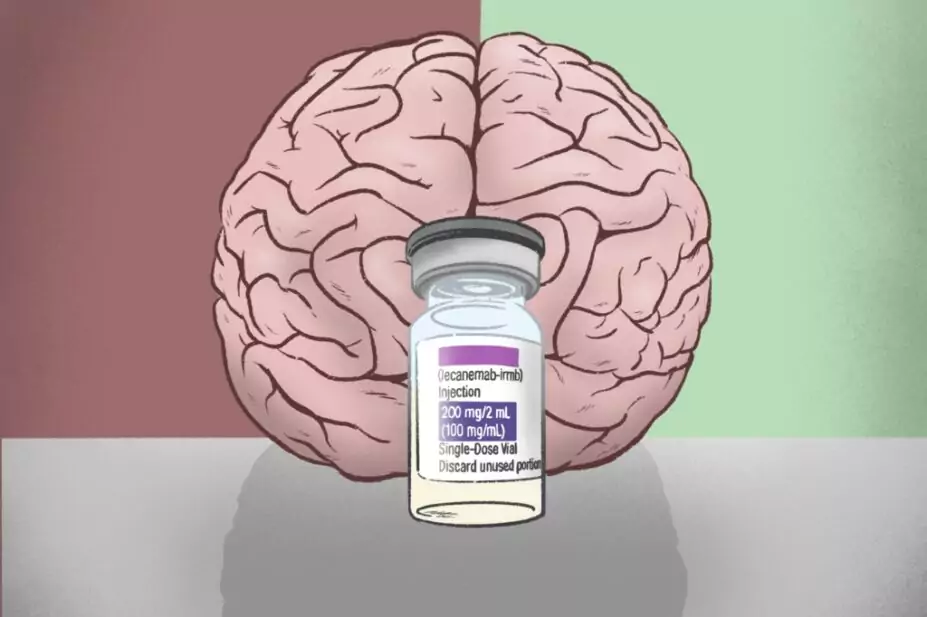
Wes Mountain/The Pharmaceutical Journal
Lecanemab, a new monoclonal antibody treatment for Alzheimer’s disease (AD), is currently being considered by the UK Medicines and Healthcare products Regulatory Agency (MHRA) under its accelerated ‘Innovative Licensing and Access Pathway’ (ILAP), which is aimed to fast track patient access to cutting-edge medicines.
If licensed, lecanemab would still need to be appraised by the National Institute for Health and Care Excellence (NICE) — a process that has already started — which will decipher whether it is a cost-effective treatment that should be available on the NHS.
Lecanemab binds to amyloid-beta in the brain, triggering the immune system to remove the protein, which is one of the hallmarks of AD. It was approved by the US Food and Drug Administration (FDA) in July 2023, making it the first monoclonal antibody therapy targeting amyloid-beta to receive traditional, full approval in the United States[1].
Another monoclonal antibody — donanemab, being developed by Lilly — is showing promising clinical trial results and was submitted to the FDA for approval in July 2023, with a decision expected before the end of the year[2].
Aducanumab, yet another monoclonal antibody therapy, received FDA accelerated approval in June 2021. However, there was controversy over the decision, which was based on a surrogate marker — the reduction of amyloid plaques in the brain — and was taken despite the FDA advisory committee’s majority vote against it. The committee cited a lack of evidence that supported aducanumab’s clinical benefit, with two phase III trials, ‘EMERGE’ and ‘ENGAGE’, showing conflicting results[3].
At an estimated annual cost of US$56,000 per year per patient, and with a significant side-effect profile, some experts have argued that the FDA was too quick to approve aducanumab and, in December 2021, the European Medicines Agency refused to licence it[4,5].
Lecanemab, while still expensive, is being marketed at a lower price and has a lower frequency of side effects; it also seems to have a greater effect on slowing symptoms[6,7].
But is the NHS ready for a disease-modifying drug for AD? Is it a cost-effective intervention, and how much benefit would patients really be likely to see?
The case for:
A ‘game changer’
It is estimated that about 850,000 people are living with AD and other types of dementia in the UK, and this number is on the rise. Currently, there are no treatments that stop or slow down the progression of AD.
The current drugs don’t do an enormous amount
Karen Newman, a pharmacist specialising in dementia at Sussex Partnership NHS Foundation Trust
“If you present to a memory assessment clinic and you’ve got mild cognitive impairment, there is really nothing for you,” says Karen Newman, a pharmacist specialising in dementia at Sussex Partnership NHS Foundation Trust. “The current drugs don’t do an enormous amount,” she says.
Lecanemab, which is manufactured by Biogen and Eisai, could change that. In the industry-funded ‘CLARITY-AD’ phase III trial, which involved 1,795 participants with early AD, the drug was found to slow decline on a cognitive function scale by 27% compared with placebo over an 18-month period[7]. This was accompanied by a statistically significant reduction in the amount of amyloid-beta seen in patients’ brains on a positron emission tomography (PET) scan.
“They say [lecanemab] delayed disease progression by five months, so it might give somebody five months longer of living independently,” says Newman. This would be a meaningful difference for many patients, to enable them to stay in their own home or drive for longer, for example.
However, Newman cautions that more, longer-term data is needed to instil confidence about lecanemab’s impact on patients in a real-world setting. “[The study] only ran for 18 months,” she points out.
Many experts believe that lecanemab’s biggest significance is that it changes the field in a way that aducanumab did not quite manage.
Lecanemab was the first drug to show evidence of slowing down the progression of Alzheimer’s disease
Fiona Carragher, director of research and influencing at Alzheimer’s Society
“Lecanemab was the first drug to show evidence of slowing down the progression of AD,” says Fiona Carragher, director of research and influencing at Alzheimer’s Society.
Lecanemab also lends weight to John Hardy’s ‘amyloid hypothesis’, which posits that deposition of amyloid-beta is the causative agent of AD; therefore, preventing or clearing amyloid-beta should modify the course of the illness. Given that amyloid-beta — and the neurofibrillary tangle tau — are the hallmarks of AD, scientists have been puzzled by the repeated failure of earlier drugs targeting amyloid, of which there have been many[8]. Lecanemab is reported to bind most strongly to amyloid-beta protofibrils, while earlier drugs targeting amyloid preferred more highly aggregated forms[9].
Hardy, a professor of neuroscience at University College London, laid out the amyloid hypothesis in a seminal 1992 paper co-authored with Gerald Higgins[10]. “From a basic science point of view, lecanemab tells us what we need to do to have an effective drug,” he says, pointing to a future of amyloid-targeting drugs.
A phase III clinical trial of donanemab, which appears to work in a similar way to lecanemab, published in July 2023, suggests it slows disease progression by 35% over 76 weeks in patients with the earliest stage of the disease[2].
“We are soon going to have a situation where there are two drugs available which slow decline if given to the right patients at the right time,” Hardy says, adding that he believes other, better drugs will follow on behind.
It is probable that some of these will target tau, rather than amyloid. There are already several anti-tau agents in phase II clinical trials, and Eisai is currently testing its anti-tau antibody in combination with lecanemab[11,12]. “I would think that down the line we’re going to head for polypharmacy,” Hardy says.
The case against:
Cost effectiveness
At an estimated cost of US$26,500 per patient per year, lecanemab may be cheaper than aducanumab, but it still has a hefty price tag[13]. “Making antibodies is not cheap,” Hardy says.
Drug companies also need to recoup the costs of multiple failed trials, Hardy points out. “They have invested a fortune and now they’ve got to repay those investments.”
That price needs to be set against the benefits for patients and the side-effect profile. In the ‘CLARITY-AD’ trial, the main side effects were infusion reactions[6]. “Things like flushing, fever, chills, body aches,” Newman says, “which, if you know they’re going to happen, you can pre-empt.”
But then there were the amyloid-related imaging abnormalities (ARIA), the same class of side effects that caused concern with aducanumab. These are caused by the antibodies targeting amyloid-beta deposits in blood vessels and show up on MRI scans as either oedema or microhaemorrhages.
“In both cases, they were more likely to happen in the treatment arm,” Newman says. In most patients, these imaging abnormalities were not accompanied by any discernible symptoms. But neuroscientists have warned that these side effects — possibly exacerbated by being on blood-thinning medicines — may cause fatal brain swelling and bleeding in a few unlucky patients[14]. However, Eisai has stressed that there were similar numbers of deaths in the lecanemab and placebo arms of the trial, and no deaths were related to lecanemab or occurred with ARIA during the study period.
For patients who do develop symptoms, such as headaches, confusion and dizziness, clinicians face a choice. “They might continue with extra monitoring or they might stop [the drug],” Newman says.
We should get more educated about what to look for in terms of side effects
John Hardy, professor of neuroscience at University College London
Hardy thinks that, with time, these calls will get easier. “We should get more educated about what to look for in terms of side effects so that side effects can be monitored and dealt with more easily,” he says.
He also suggests that there could be the potential for ‘drug holidays’.
“You get your amyloid down and then you stop treating for a while until the amyloid comes back up,” he says, pointing out this would also “reduce the expense of it”.
Infrastructure
The main concern experts cite about lecanemab approval is that the NHS is not set up to deliver a disease-modifying drug for AD. “To give these drugs the best chance of working, the healthcare system needs to be able to diagnose people with Alzheimer’s as early in their disease progression as possible,” Carragher says.
Alzheimer’s Society has partnered with Alzheimer’s Research UK and the National Institute for Health and Care Research (NIHR) to try and address this problem. In May 2023, they opened applications for a grant to assist with the development of blood-based biomarkers[15].
“We’re not quite there in terms of the science behind fluid biomarkers but we’re reasonably close,” Hardy says. However, he is concerned that there is a more fundamental problem.
Although some research hubs, such as the University College London Queen Square Institute of Neurology, where Hardy works, have biomarker laboratories and are “set up to some extent”, he points out that this is unusual. Most hospitals do not have the same infrastructure.
“We’re going to really need to reorganise our clinical services,” Hardy adds.
We’re just not ready at the moment for lecanemab to be approved by us
Karen Newman, a pharmacist specialising in dementia at Sussex Partnership NHS Foundation Trust
Newman agrees. “We’re just not ready at the moment for lecanemab to be approved by us,” she says. “You need to have people working together — neurology and mental health and primary care — and those staff would have to be trained,” she adds.
As well as early diagnosis, testing for a genetic variant — called APOE4 — that increases the risk of developing AD should be carried out before starting treatment, because patients who have two copies of APOE4 — approximately 2–5% of people with AD — are thought to have a higher incidence of ARIA.
Owing to the risk of ARIA, patients on lecanemab also need monitoring, which requires regular brain scans.
The UK languishes behind many other countries in terms of its number of MRI scanners, with only 6.1 MRI systems per million people, fewer than countries including Estonia and Slovenia, and considerably less than the United States, which has 38.1 scanners per million[16].
Hardy believes that lecanemab’s approval would stimulate a much-needed paradigm shift in the way we think about dementia. He compares the situation to what happened with multiple sclerosis (MS).
“There didn’t used to be any treatments for MS, then interferons came along.”
He notes that they were “marginally effective and had very unpleasant side effects” but that they stimulated a change in the way the clinical community thought about the disease and how they were organised.
Other experts think that there should be a focus on lower hanging fruit, such as helping people avoid known risk factors. “[Data show that] 40% of your dementia risk is likely to be modifiable,” Newman says, citing factors like wearing hearing aids if needed, limiting alcohol intake and stopping smoking.
“I have heard extremely strong opinions on both sides,” Hardy says. “I personally think [NICE] should approve lecanemab, maybe with rather narrow guidelines about when it should be available.”
Our verdict
The number of people with AD is growing and new treatments are urgently needed. Lecanemab represents an exciting step forward for researchers, paving the way for more and better drugs to follow.
The disease is a huge challenge for the NHS. Clinical services in the UK need an urgent overhaul so that people with AD can be identified and diagnosed earlier, as well as treated with drugs such as lecanemab. This means reorganising clinical teams, getting ready for the routine administration of fluid biomarker tests and increasing the number of available MRI scanners.
While many patients and relatives of those with AD will be desperate to see lecanemab approved, the MHRA should take lessons from aducanumab and consider all the evidence. Should it clear that hurdle, there are arguments on both sides as to lecanemab’s cost effectiveness, especially in a real-world setting.
Nonetheless, as Carragher says, there is reason to hope that “treatments like [lecanemab] put us on the road to turning dementia from a terminal to a chronic condition”.
- 1FDA Grants Accelerated Approval for Alzheimer’s Disease Treatment. US Food and Drug Administration. 2023.https://www.fda.gov/news-events/press-announcements/fda-grants-accelerated-approval-alzheimers-disease-treatment (accessed 18 Jul 2023).
- 2Sims JR, Zimmer JA, Evans CD, et al. Donanemab in Early Symptomatic Alzheimer Disease. JAMA. 2023. doi:10.1001/jama.2023.13239
- 3Budd Haeberlein S, Aisen PS, Barkhof F, et al. Two Randomized Phase 3 Studies of Aducanumab in Early Alzheimer’s Disease. J Prev Alz Dis. 2022. doi:10.14283/jpad.2022.30
- 4Sinha P, Barocas JA. Cost‐effectiveness of aducanumab to prevent Alzheimer’s disease progression at current list price. A&D Transl Res & Clin Interv. 2022;8. doi:10.1002/trc2.12256
- 5Aduhelm: Withdrawal of the marketing authorisation application. European Medicines Agency. 2022.https://www.ema.europa.eu/en/medicines/human/withdrawn-applications/aduhelm (accessed 18 Jul 2023).
- 6Tampi RR, Forester BP, Agronin M. Aducanumab: evidence from clinical trial data and controversies. DIC. 2021;10:1–9. doi:10.7573/dic.2021-7-3
- 7van Dyck CH, Swanson CJ, Aisen P, et al. Lecanemab in Early Alzheimer’s Disease. N Engl J Med. 2023;388:9–21. doi:10.1056/nejmoa2212948
- 8Murphy MP, LeVine H. Alzheimer’s Disease and the Amyloid-β Peptide. JAD. 2010;19:311–23. doi:10.3233/jad-2010-1221
- 9Lecanemab Sweeps Up Toxic Aβ Protofibrils, Catches Eyes of Trialists. Alzforum. 2021.https://www.alzforum.org/news/conference-coverage/lecanemab-sweeps-toxic-av-protofibrils-catches-eyes-trialists (accessed 18 Jul 2023).
- 10Hardy JA, Higgins GA. Alzheimer’s Disease: The Amyloid Cascade Hypothesis. Science. 1992;256:184–5. doi:10.1126/science.1566067
- 11Ji C, Sigurdsson EM. Current Status of Clinical Trials on Tau Immunotherapies. Drugs. 2021;81:1135–52. doi:10.1007/s40265-021-01546-6
- 12DIAN-TU selects lecanemab as background anti-amyloid therapy in clinical trial evaluating investigational therapy targeting tau for dominantly inherited Alzheimer’s disease. Eisai. 2021.https://www.eisai.com/news/2021/news202184.html (accessed 18 Jul 2023).
- 13Jönsson L, Wimo A, Handels R, et al. The affordability of lecanemab, an amyloid-targeting therapy for Alzheimer’s disease: an EADC-EC viewpoint. The Lancet Regional Health – Europe. 2023;29:100657. doi:10.1016/j.lanepe.2023.100657
- 14Scientists tie third clinical trial death to experimental Alzheimer’s drug. AAAS Articles DO Group. 2022. doi:10.1126/science.adg4121
- 15Apply to The Blood Biomarker Challenge. Alzheimer’s Society. 2023.https://www.alzheimers.org.uk/research/researchers/grants/biomarker-centre-of-excellence (accessed 18 Oct 2023).
- 16NHS must do more to future-proof its MRI capacity, say imaging experts. Royal College of Radiologists. 2017.https://www.rcr.ac.uk/posts/nhs-must-do-more-future-proof-its-mri-capacity-say-imaging-experts (accessed 18 Jul 2023).


